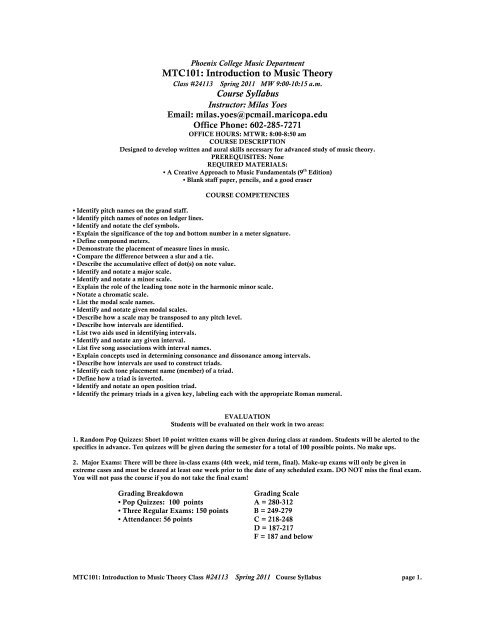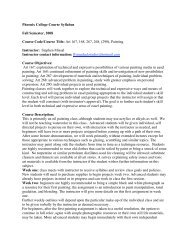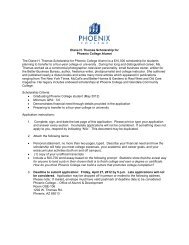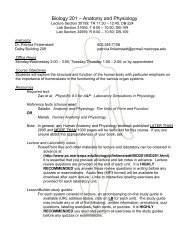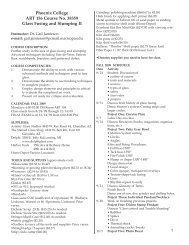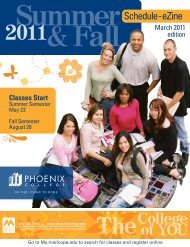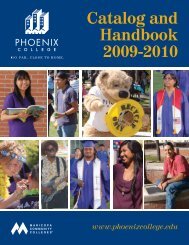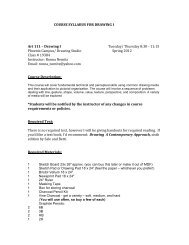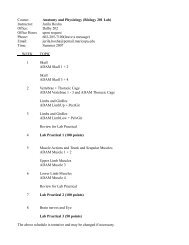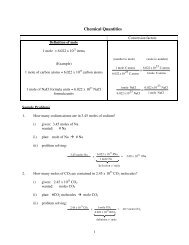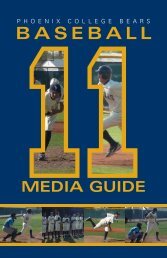MTC101: Introduction to Music Theory Course Syllabus
MTC101: Introduction to Music Theory Course Syllabus
MTC101: Introduction to Music Theory Course Syllabus
You also want an ePaper? Increase the reach of your titles
YUMPU automatically turns print PDFs into web optimized ePapers that Google loves.
Phoenix College <strong>Music</strong> Department<br />
<strong>MTC101</strong>: <strong>Introduction</strong> <strong>to</strong> <strong>Music</strong> <strong>Theory</strong><br />
Class #24113 Spring 2011 MW 9:00-10:15 a.m.<br />
<strong>Course</strong> <strong>Syllabus</strong><br />
Instruc<strong>to</strong>r: Milas Yoes<br />
Email: milas.yoes@pcmail.maricopa.edu<br />
Office Phone: 602-285-7271<br />
OFFICE HOURS: MTWR: 8:00-8:50 am<br />
COURSE DESCRIPTION<br />
Designed <strong>to</strong> develop written and aural skills necessary for advanced study of music theory.<br />
PREREQUISITES: None<br />
REQUIRED MATERIALS:<br />
• A Creative Approach <strong>to</strong> <strong>Music</strong> Fundamentals (9 th Edition)<br />
• Blank staff paper, pencils, and a good eraser<br />
COURSE COMPETENCIES<br />
• Identify pitch names on the grand staff.<br />
• Identify pitch names of notes on ledger lines.<br />
• Identify and notate the clef symbols.<br />
• Explain the significance of the <strong>to</strong>p and bot<strong>to</strong>m number in a meter signature.<br />
• Define compound meters.<br />
• Demonstrate the placement of measure lines in music.<br />
• Compare the difference between a slur and a tie.<br />
• Describe the accumulative effect of dot(s) on note value.<br />
• Identify and notate a major scale.<br />
• Identify and notate a minor scale.<br />
• Explain the role of the leading <strong>to</strong>ne note in the harmonic minor scale.<br />
• Notate a chromatic scale.<br />
• List the modal scale names.<br />
• Identify and notate given modal scales.<br />
• Describe how a scale may be transposed <strong>to</strong> any pitch level.<br />
• Describe how intervals are identified.<br />
• List two aids used in identifying intervals.<br />
• Identify and notate any given interval.<br />
• List five song associations with interval names.<br />
• Explain concepts used in determining consonance and dissonance among intervals.<br />
• Describe how intervals are used <strong>to</strong> construct triads.<br />
• Identify each <strong>to</strong>ne placement name (member) of a triad.<br />
• Define how a triad is inverted.<br />
• Identify and notate an open position triad.<br />
• Identify the primary triads in a given key, labeling each with the appropriate Roman numeral.<br />
EVALUATION<br />
Students will be evaluated on their work in two areas:<br />
1. Random Pop Quizzes: Short 10 point written exams will be given during class at random. Students will be alerted <strong>to</strong> the<br />
specifics in advance. Ten quizzes will be given during the semester for a <strong>to</strong>tal of 100 possible points. No make ups.<br />
2. Major Exams: There will be three in-class exams (4th week, mid term, final). Make-up exams will only be given in<br />
extreme cases and must be cleared at least one week prior <strong>to</strong> the date of any scheduled exam. DO NOT miss the final exam.<br />
You will not pass the course if you do not take the final exam!<br />
Grading Breakdown<br />
Grading Scale<br />
• Pop Quizzes: 100 points A = 280-312<br />
• Three Regular Exams: 150 points B = 249-279<br />
• Attendance: 56 points C = 218-248<br />
D = 187-217<br />
F = 187 and below<br />
<strong>MTC101</strong>: <strong>Introduction</strong> <strong>to</strong> <strong>Music</strong> <strong>Theory</strong> Class #24113 Spring 2011 <strong>Course</strong> <strong>Syllabus</strong> page 1.
ATTENDANCE<br />
* Students receive 2 points per class. There are 28 class meetings.<br />
• Attendance for this class is manda<strong>to</strong>ry. Students will acquire and apply new<br />
skills on a daily basis. These skills are continually comprehensive.<br />
• After three consecutive absences, the student may be dropped at the discretion of<br />
the professor.<br />
• Please inform the instruc<strong>to</strong>r of any absences by phone, email, or in person prior<br />
<strong>to</strong> class time. Extenuating circumstances will be considered at the discretion of<br />
the instruc<strong>to</strong>r.<br />
• Class time begins at the posted start time. Every two late arrivals will be<br />
counted as one unexcused absence.<br />
STUDENT RESPONSIBILITIES<br />
• Students are responsible for knowing all college policies that pertain <strong>to</strong> them as<br />
found in the college catalog and student handbook. College catalogs and student<br />
handbooks can be obtained from Admissions and Records or viewed online from<br />
the Phoenix College website (http://www.pc.maricopa.edu under the “Student<br />
Services” section).<br />
DISABILITY SUPPORT SERVICES<br />
• It is a college policy <strong>to</strong> provide reasonable accommodations <strong>to</strong> students with<br />
disabilities. If you would like <strong>to</strong> request accommodations due <strong>to</strong> a physical,<br />
mental, or learning disability, please contact the Disability Resource Center<br />
office, Learning Center (LC) Building, telephone: 602.285.7477.<br />
OTHER INFORMATION<br />
• Class participation is essential, both in conversations about the <strong>to</strong>pics and<br />
exercises performed in class. You are expected <strong>to</strong> actively participate in order <strong>to</strong><br />
develop your skills.<br />
• Please complete assignments and tests in PENCIL. Complete all homework<br />
directly in your workbook and carefully tear out the pages before turning them in<br />
<strong>to</strong> the instruc<strong>to</strong>r.<br />
• Food and drink are not allowed in any classrooms, especially the Piano Lab.<br />
• Use of cell phones, pagers, etc. is strictly forbidden during class time. Any<br />
student found text messaging will be asked <strong>to</strong> leave.<br />
<strong>MTC101</strong>: <strong>Introduction</strong> <strong>to</strong> <strong>Music</strong> <strong>Theory</strong> Class #24113 Spring 2011 <strong>Course</strong> <strong>Syllabus</strong> page 2.
<strong>Syllabus</strong> Acknowledgment Form<br />
MTC 101: <strong>Introduction</strong> <strong>to</strong> <strong>Music</strong> <strong>Theory</strong> Class #24113<br />
Instruc<strong>to</strong>r: Milas Yoes<br />
Spring 2011<br />
I, __________________________________, acknowledge that I have received a copy of the<br />
course syllabus for this class and the instruc<strong>to</strong>r has discussed the contents of the<br />
syllabus. I have read it and understand the course content, class procedures, and<br />
what is expected of me <strong>to</strong> earn credit with a specific grade in this class.<br />
Signature: ________________________________<br />
Date: _______________<br />
Student Information Form<br />
Name: _____________________________________________________________<br />
Address: ___________________________________________________________<br />
City: _____________________________Zip Code: ________________<br />
Home phone: _________________<br />
Cell phone: _________________<br />
email: __________________________________________<br />
Major: ________________________<br />
<strong>Music</strong>al Instrument: ____________________<br />
<strong>MTC101</strong>: <strong>Introduction</strong> <strong>to</strong> <strong>Music</strong> <strong>Theory</strong> Class #24113 Spring 2011 <strong>Course</strong> <strong>Syllabus</strong> page 3.


